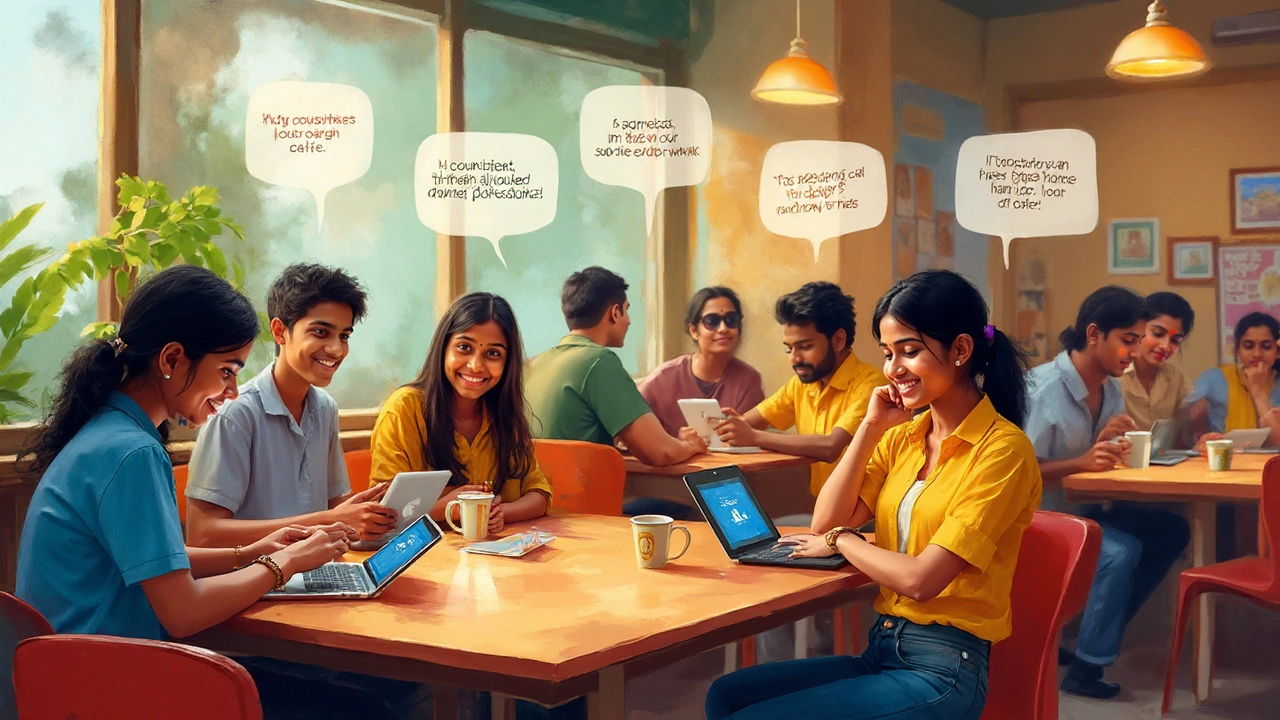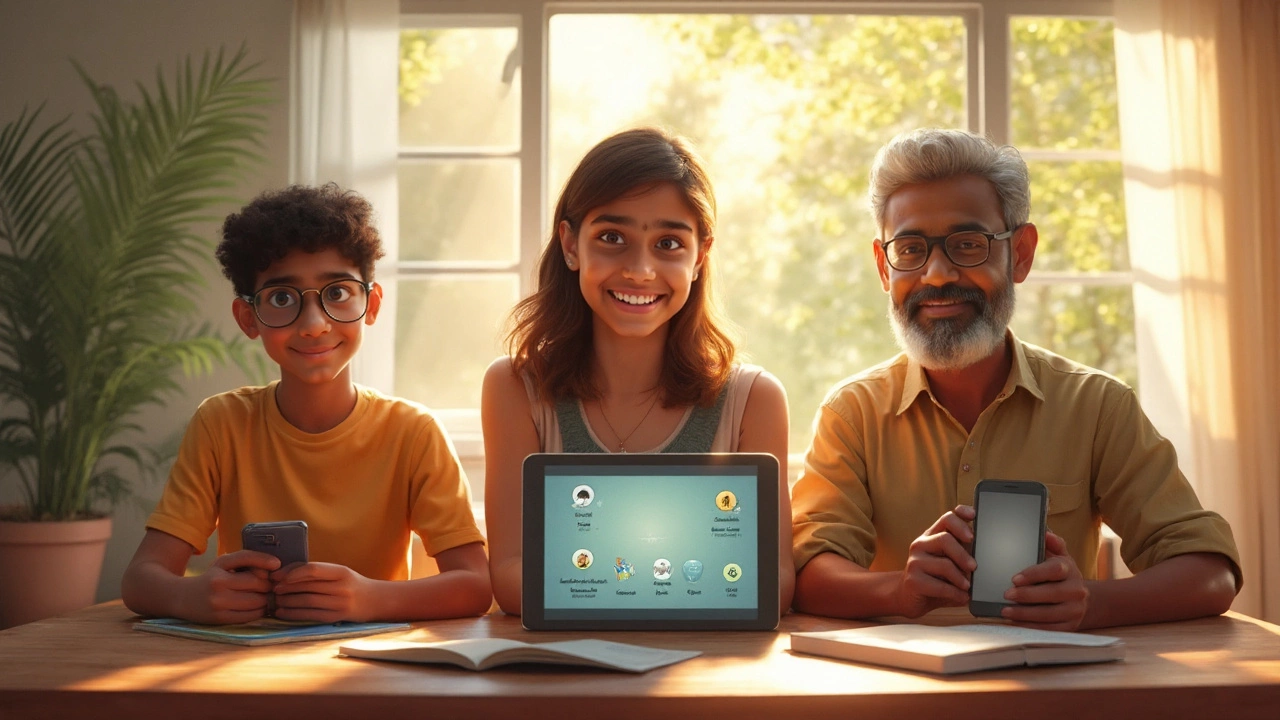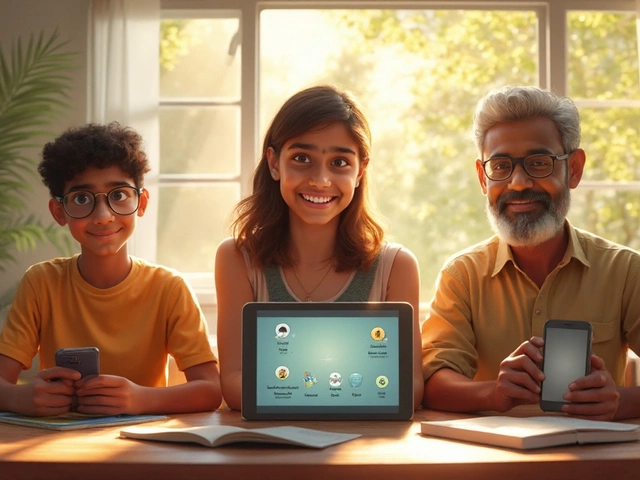If you ask ten people to name the best way to learn English today, you'll get fifteen different answers. Everybody's hunting for shortcuts, secrets, or that app everyone's talking about. Here's a wild stat: over 1.5 billion people are studying English worldwide, and more folks use their phones to do it than anywhere else. You've probably seen ads promising you can speak like a native in a month. Sound too good to be true? Let's put the hype to the test—with real facts and user stories.
What Makes an App Truly Great for Learning English?
It's not just about which app looks the prettiest or has the funniest mascot. The best English learning app nails three big things: it gets you talking (not just memorizing), it actually fits your daily life, and it keeps you hooked without feeling like old-school homework. People give up because apps get boring or feel pointless. So, what keeps you coming back? Daily streaks, friendly nudges, and the feeling you’re making real progress. If the app uses smart tech—like speech recognition to correct your accent or adjusts tasks to fit your skill—it makes things stick way better. Think about how Duolingo sends you reminders at just the right time, or how Babbel sets up real-world conversations early, not just word lists. These features matter.
It’s also huge if the app personalizes lessons. If you’re prepping for the IELTS, you don’t care about “holiday vocabulary” or slow stories for beginners. You want test drills and feedback targeted at what you need. Good apps catch your weak spots and push you right there. Pay attention to apps that let you pick goals—passing tests, mastering business talk, or just chatting for travel. Real-time feedback is a game changer, too. Voice recognition tech isn’t perfect, but it’s come a long way since those robotic voices in old language tapes. Apps now use AI to gently tell you, "Hey, that ‘th’ sound needs work.”
Motivation is a sneaky part of all this. Language apps become daily habits only if you see progress or feel rewarded. Badges, leaderboards, and challenges work better than just a boring “congratulations” screen. This isn’t just feel-good stuff. According to an MIT study from 2023, users who got regular, game-like feedback finished 25% more lessons than those who didn’t. Community also matters. If there’s a way to connect with real speakers or learners, or join a group challenge, you’re more likely to stick with it. An app is only as good as how often you use it—and keep using it.
Popular English Learning Apps: Deep Dive and Honest Pros & Cons
Let’s break down the big names you see at the top of every app store chart. Each has its style, and not everyone learns the same way. But the numbers don’t lie. Here’s some raw data from 2025 to put things into perspective:
| App | Monthly Active Users (2025) | Average Daily Use (minutes) | Rating (Google Play/App Store) | Cost |
|---|---|---|---|---|
| Duolingo | 65 million | 18 | 4.5 | Free/$10 month for Plus |
| Babbel | 11 million | 16 | 4.6 | $13.95/month |
| Busuu | 8 million | 14 | 4.4 | Free/$11.99 month for Premium |
| Memrise | 6 million | 12 | 4.7 | Free/$8.49 month for Pro |
| Rosetta Stone | 4 million | 10 | 4.3 | $11.99/month |
best app to learn English—that phrase grabs everyone. But which one actually delivers? Duolingo gets you started faster with its playful interface, and it’s free if you don’t mind ads. But many users hit a wall when they leave the basics. Babbel impresses with lessons built by humans (not just algorithms), and it boosts your conversation chops from early on. On the other hand, it’s not free. Busuu mixes in social learning: you write or speak, and native speakers give you feedback. That real connection is gold for many learners, but waiting on feedback isn’t for the impatient. Memrise stands out for short video clips of real people speaking street English, which gets you used to accents and slang way beyond textbook stuff. Rosetta Stone still has its fans for its “no translation” immersion, but it’s a bit old-school and can feel slow for impatient folks.
When it comes to actual progress, a 2024 study by the University of Tokyo found that Duolingo users improved reading and listening quickly, but stumbled when asked to speak outside the app. Babbel and Busuu users, who spent more time on real conversations, reported higher speaking confidence after 12 weeks. If you want free and fun, Duolingo can’t be beat to start. Want real conversations, fast? Busuu and Memrise might do it. Babbel is a solid all-rounder if you’re willing to put some money in and keep things steady, especially for grammar and sentence structure.

Learning Styles and Picking Your Perfect Match
Every app has its die-hard fans, and it all comes down to your learning style. Are you a gamer who needs streaks and rewards to keep going? Duolingo could be your jam. Do you swear by voice calls and writing exercises? Busuu and HelloTalk thrive on user interaction, and you’ll find lots of folks ready to chat, help, and even correct your mistakes in real-time. If you love grammar drills and want lessons to follow a real curriculum, Babbel helps you progress logically—great for those who want structure, not just games.
If you’re about busy schedules and squeezing English practice into five-minute snack breaks, Memrise is great. The short real-life videos help with pronunciation and everyday words, plus mobile quizzes never feel like a chore. Prefer an app that adapts to you as you go? The best-rated platforms use AI to spot what you struggle with and bring it up again. They’ll remember you hate irregular verbs and keep them coming till you nail it. Don’t get stuck thinking you need to spend money, either. All top apps offer enough free content to get started—you can upgrade only if you’re hooked, or hit a paywall for advanced stuff.
Age matters, too. Young learners often jump on Duolingo or Memrise for fun and color, but adults heading for a job abroad might lean toward Babbel, or even Rosetta Stone for more serious courses. There’s no rule saying you can’t use two apps at once. Stack Duolingo for daily basics and HelloTalk or Tandem for live chats, and you’ll get the best of both worlds.
Hidden Features, Success Tips, and Common Mistakes to Avoid
Lots of people never even notice some of the best tools in these apps. Did you know that Busuu schedules reminders based on your local time zone? It’s crazy effective for forming habits. Babbel, meanwhile, lets you pick career-focused tracks and custom review sessions for tricky words. Memrise users can record themselves, then compare their speech to locals—a game-changer for fixing pronunciation way faster than reading phonetic scripts. And if streaks motivate you, set challenges with friends and watch the app’s leaderboard whip up some friendly competition.
But there’s a catch. Some users burn out chasing streaks or get obsessed with keeping up their daily score, only to lose track of real progress. Don’t let gamification distract from using the language. If you’re learning English to travel or work, set up language exchanges, or use your new vocab in chats or short emails, not just tapping flashcards. Another beginner trap: ignoring pronunciation and listening drills. Reading and writing can mislead you—real conversations throw real-life speed and accents at you. Take advantage of voice features and don’t be embarrassed by bad scores. Everyone starts somewhere.
Pro tip: Install a dictionary app alongside your main learning app. Having a quick-access dictionary or translation tool keeps you from getting stuck, and the best language learners I know swear by this combo. And don’t forget—don’t just rely on one app’s recommendations. Follow teachers and forums for extra resources, YouTube clips, movies, podcasts, even social media in English. Combine study methods and you cut boredom and boost real skill.

Which App Is Best For You? Real-World Use Cases and Personal Stories
Let’s get beyond the charts. Picture Nguyen, a chef in Hanoi who needed to understand English recipes and talk to tourists. He started with Duolingo to get through basics on his commute, then switched to Memrise for food vocabulary videos. Six months later, he holds casual conversations with British backpackers at his food stall. Then there’s Aman, a software engineer in Mumbai. His workplace requires international meetings. Babbel hooked him with grammar drills, but Busuu gave him direct feedback from real English speakers—he aced his first team video call in two months.
Or look at Linda, a retiree in Valencia who never studied English but wanted to chat while traveling. She uses Duolingo daily, but what really kicked her skills up? Joining a Tandem conversation exchange. Compared to classrooms, apps fit into unpredictable lives—stuck in a doctor’s office, five minutes before bed, or during lunch. When you ask which app is “best,” it’s really about which fits around your life and habits.
The most effective learners stay consistent, mix up study methods, and set super-specific, real-life goals. If your English app makes you curious, pushes you to speak (even by talking to yourself), and makes you smile most days—that’s a win.





Write a comment